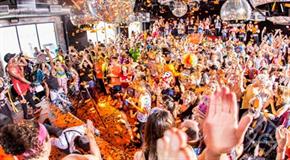Features
Dance Floors In The Morning

Young professionals are getting up before the sun rises for dance music, yoga and natural juice in cities around the world, providing an alternative for those seeking core club elements without the drugs or drama associated with nightlife.
While people have been partying until the sun comes up for as long as cultures have danced, the movement some have described as “conscious clubbing” has developed trademarks of being alcohol and drug free and usually happens on weekdays, before most people start work.
These forms of morning raves started in May 2013 with Morning Gloryville in London. Later that year, a second function called Daybreaker began a rise to prominence. The two organizations currently mix the largest gatherings of this type.
Daybreaker has regular events once or twice a month in 10 cities, most in the U.S., while Morning Gloryville has events in 22 cities, many of which occur monthly. The best attended of these events draw more than 1,000 regularly.
“The word ‘sober’ is misunderstood,” Daybreaker co-founder Radha Agrawal told Pollstar. She said the word’s connotations of seriousness or solemnity do not describe the environment accurately. “We’re high on life. We’re high on music. We’re high on actually making eye contact and having conversation. We’re high on community building. We’re high on giving people a home to call home in these lonely cities.”
Morning Gloryville SF director McKenzie Brill said that one of the most important elements of the events is integrating community and wellness into the work week. The events draw participants from a variety of age groups, but the majority fit squarely into the Millennial demographic in their 20s and 30s.
“The concept started with the idea that when you feel good, you do good and you take that energy into your day, and what a wonderful gift to give to people,” she said. “It really does sell itself.”
Agrawal said the connection with the workplace was important for these morning events not just for individuals, but that teams from LinkedIn, Google, and Nike had come to the event as a group bonding experience.
Agrawal said Daybreaker does not view itself as in competition with Morning Gloryville, and that the two events are often in communication to make sure that there is no overlap in scheduled dates in the same cities. Brill said both organizations are conscious of not oversaturating the market, knowing that there is inevitably a spillover or cross-pollination between the two.
As a main source of revenue, both rely on ticket sales, which come with dancing, yoga, free juice and coffee, and other elements such as poetry. Both have utilized sponsors, but Daybreaker has courted much larger and more prominent sponsors such as Nike and Macy’s. These corporate sponsorships distinguish Daybreaker as a highly produced event, Agrawal said, which she views as a marrying of the worlds of nightlife and wellness.
“Our main goal is to marry these worlds that have not been playing together in so long,” Agrawal said. “A lot of these brands can’t put their name on drug-infused experiences. … A lot of these brands that could never play in the nightlife sandbox before can play with us.”
Agrawal said the eagerness of corporations to connect with young professionals in this communal, sober environment has opened up many opportunities for growth, but these are being considered thoughtfully. One growth goal of Daybreaker is to start a new event in a new city each month, and to make sure that these initial events are characterized by the same spirit of community and consistency that all of Daybreaker’s existing iterations share, she said.
“Daybreaker is not a party. We are not a bucket-list item. We are a monthly check-in. You can’t get the benefits of the [community] if you only come once,” she said.
In addition to the regular morning gatherings, Daybreaker hosts special events such “Daybreaker Week” and an evening event, “Dusk”.
Morning Gloryville, Brill said, is very selective about partnering with brands and is not seeking to aggressively expand. Although there have been exceptions, Brill said that most of the vendors who MGSF invites to participate in the events are local businesses and are not charged a vendor’s fee.
“We’re not necessarily building to sell,” Brill said. “To us it’s more about community than it is a product. … We are not a product; we are a community offering.”
Related to her organization’s goals with expanding, Brill said that Morning Gloryville is learning the difference between allowing cities to organize events that occur only once, and nurturing communities around recurring events.
“A big part of [our plan] is not just getting overly excited and saying ‘yes’ and run with it [whenever opportunities arise], but actually making sure people want to tend to a community,” Brill said. “There is a difference between hosting an event for customers and hosting an ongoing love project for a community of people that wants to keep coming back.”
Agrawal said the main point of the event was to provide a space in which people can become connected to a community, as many young people are seeking alternatives to traditional religious and social spaces.
“The idea is that millennials are looking for these kinds of connections,” Agrawal said. “We are trying to build a community where everyone knows your name. [And] we have that in every city.”
Brill similarly said once people see the inclusivity of the space, it relieves any anxiety that these events are for a certain age or type of people.
“Our biggest competition is the alarm clock, to get over that hump and make it through the door,” Brill said. “Once they get through the door and they see everyone else doing it, they see this is OK and this is actually a very comfortable, safe space to let go.”